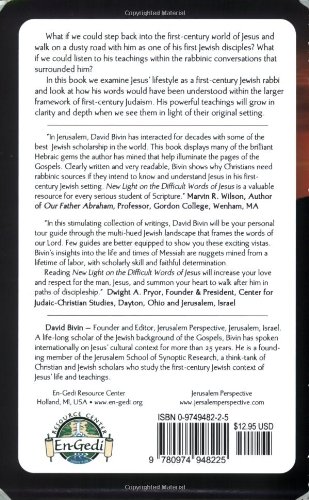



New Light on the Difficult Words of Jesus: Insights from His Jewish Context
E**K
Jewish Background Helps Open Up the Gospels
The volume is subtitled, "Insights from His [Jesus] Jewish Context," and it lives up to its subtitle. Plenty of stimulating insights here.David Bevin has collected and revised 22 articles he wrote for a "Jewish Roots" journal, The Jerusalem Perspective, and compiled them into a most interesting book.The book is subdivided into four main heading, the first of which is "A Jewish Rabbi Name Jesus." This section includes articles about Jesus' formal education, the common practice of discipleship in first century Judaism, and the accuracy of Oral Tradition.The second section is titled, "Jesus' First Century Jewish Context" and includes information about hems, tassels, Jewish prayers, and examples of rabbis who remained single until later in life.The third section is titled, "New Light on Jesus' Teachings" and address Jesus' view of riches, pacifism, and divorce.The fourth section is titled, "The Kingdom is Here" and addresses Jesus as the Messiah-Prophet, the requirements for gentile believers (Acts 15), and Paul's Olive Tree Analogy.The positives of this book far outweigh the negatives. Just reading relevant portions from the Talmud, for example, amplifies many Biblical passages. The information about discipleship was especially enlightening. I never realized that there were several hundred other rabbis roaming throughout Israel with bands of disciples during the time of Christ. The Talmudic ruling that a man who was going to follow a rabbi for more than 30 days needed permission from his wife evidences how common discipleship was during that era.The author frequently suggests that while many of Jesus' practices were main stream for that time, others - such as claiming to be Messiah and working miracle after miracle - were not!The chapter about why Jesus did not get married is particularly relevant in the light of the popularity of the fictional "Da Vinci Code." The examples of famous rabbis who married later in life are helpful (even if a footnote suggests some assume Jesus was married because of the Bible's silence; such a viewpoint ignores the issue of offspring fathered by a man without a sin nature).I do have some reservations with this material, however. Whereas many Christians have divorced Jesus from His Jewish context and present all of Jesus' teachings as original, this book (and some others) present too many of Jesus' teaching as not original at all. If one is determined to align all but a few of Jesus' teachings with those of the rabbis, an artificial template inhibits the true interpretation of Jesus' words. You make it fit because you think it is supposed to fit -- whether it really fits or not. The author also does not seem to give much creedance to the Gospel of John (as though it has no bearing on the synoptics).Another example of where I disagree includes the author's belief that Jesus viewed the "heavy" and "light" commandments as bearing equal weight. Then what about Jesus' criticism toward those who strained at gnats and swallowed camels? If camels and gnats are the same thing, how is this possible? Or specks and logs?The same might be said for Jesus' view toward the Oral Torah (rabbinic traditions). Although He did frequently follow much of the Oral Torah, He spoke against being obsessed with the traditions of men in contrast to the Word of God (and by the "Word of God" He meant the written Word, which He often quoted as such).Although I do admit it is hermeneutically helpful to try to back-translate Jesus' words from Greek to Hebrew, those of us who believe in both inspiration and inerrancy might have trouble with some of the author's views regarding the composition of the Gospels. The author does not hold a low view of Scripture, just not as high a view as we who espouse verbal, plenary inspiration and inerrancy.This is a short but worthwhile read. Most of the chapters run only 4 or 5 pages of text plus heavy (but sometimes interesting)footnotes. Because the information is so illuminating, 4 or 5 pages a chapter is satisfying.This book contains a wealth of gems, despite a few stones among the jewels. With those cautions, I highly recommend this work to anyone who wants to seriously and diligently study the words and works of Jesus Christ. Great for pastors, professors, Bible teachers, but only selected laymen (at least for we who are conservative evangelicals or fundamentalists). The source materials here are especially helpful even if readers draw different conclusions than Bivin does. This is the sort of material I LOVE!
J**K
Very enlightening
Having just the other day finished what I guess is the first book on this topic by the author, [book:Understanding the Difficult Words of Jesus|834505], this one seemed like an easy transition to move right into. I will say though that this one flowed a bit better and was a bit more cohesive of a story, even though it appeared this book is mainly made up of individual writings by the author that have appeared over time on their web site.While the last book opened with the first portion attempting to make a case for the idea that the gospel books were most likely originally written in Hebrew and later translated into Greek, this one did not seem to push that idea as much. Instead, to me it seemed more to be stating that the gospel message of Jesus was most likely spoken in a combination of Hebrew and Aramaic, and was therefore filled with Hebrew thought, cultural understandings, idioms, and the like; and that when these sayings, etc. were then decades later written into Greek, the translation into that language caused some things to get lost and misunderstood from the original intent and understanding. This idea is a bit more acceptable than the former, in light of the scholarship and evidence of the early manuscripts.This book then goes on to lay out an amazing story of Jesus, the culture, his position, the people around him, and the way some of his "difficult" sayings were in fact fairly common in light of their culture. At times I felt like I was walking the streets beside Jesus, seeing what he saw, hearing what the disciples heard, and experiencing much of their culture.I just felt more engrossed in the happenings of the day, and began to get a whole new sense of the happenings and sayings of our Lord. Understanding Jesus in his day to have been more of a fairly typical Rabbi of the time (though with a more powerful twist to his message), and understanding the rabbinical thoughts, sayings and understandings of that time, allows so much of what he said and did to shine forth in a more clear way.Section one focuses on Jesus the Rabbi and looks at his education, what it meant to be a disciple of a Rabbi, taking on the yoke of a Rabbi, and the preservation of a Rabbi's teaching.Section two looked at Jesus in his first century context, and explored the Jewish practice of the day, the dress and traditions of the Rabbi, the name of God, the typical prayer to God (and how it influenced the Lord's Prayer we know), the non-marriage of Jesus and the miracle on the sea of Galilee.Section three discussed various teachings of Jesus, like the rich man who rejected the kingdom, the Essene vow of hatred (the us versus them mentality), the discussion of Jesus and the jots and tittles of the law, Jesus versus pacifism, poverty, divorce and remarriage.Section four ends the book with a great look into the Kingdom and it's presence in the first century, what it meant, how it was known, how Jesus was the "prophet" and "olive tree" promised, and what it took for the Gentiles to come in to the root.Great stuff that really helps clear things up when seen in light of the full-blown Hebrew culture of Jesus' time. This book is a great introduction to understanding the Hebrew roots that assist in making the message of the New Testament much more understandable.
V**R
interestingThis
This book helped me to understand more about the hebrew culture in Jesus Time and more about his hewbrew background. Afterall the books of the Bible were written by hebrew people and filled wih hebrew expresions as well. So in order to understand the bible, one has to study hebrew culture as it was done then
A**R
Brilliant, insightful. More of it!
More people should read Bivin’s book and scholarly analysis!
P**M
Important Contextual & Cultural Insights in Understanding Jesus' Words
I'm loving this book which is putting the Messiah into the context of His day.I am learning very useful insights.
B**G
Five Stars
As a Gentile the book was very interesting.Gave a deeper understanding of the Bible from a Jewish perspective.
M**T
Five Stars
An invaluable book, an absolute necessity for any NT scholar.
Trustpilot
3 weeks ago
2 months ago